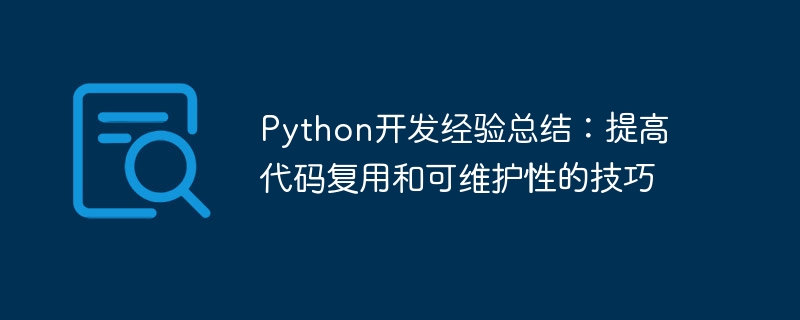Home >Backend Development >Python Tutorial >Summary of Python development experience: Tips to improve code reuse and maintainability
Summary of Python development experience: Tips to improve code reuse and maintainability
- PHPzOriginal
- 2023-11-22 19:23:461452browse

As a widely used programming language, Python is widely used in web development, data analysis, artificial intelligence and other fields. In Python development work, it is not only required to complete project tasks efficiently, but also to pay attention to the maintainability and reusability of the code. This article will summarize some tips and experiences to improve Python code reuse and maintainability, and hope to be helpful to Python developers.
1. Use functions and modules
In Python development, functions and modules are important means to improve code reusability. By encapsulating code blocks with relatively independent functions into functions, they can be easily called in different places. When the code length is long, encapsulating related functions and variables in modules can help improve the maintainability of the code and also improve the reusability of the code.
2. Design configurable parameters and options
When writing functions and classes, consider adding parameter configuration so that the function or class can adapt to more scenarios. Through parameter configuration, the code can be made more flexible and the reusability of the code can be improved. At the same time, the use of configuration also makes subsequent code maintenance more convenient, and different functions can be achieved by modifying parameter configurations.
3. Abstraction and encapsulation of duplicate code
In object-oriented programming, abstraction and encapsulation are the core of improving code reusability. In Python, by defining classes and methods, repeated code is abstracted into independent functional units, which helps to improve the reusability and maintainability of the code. At the same time, avoiding the existence of duplicate code is also conducive to the cleanliness and clarity of the code.
4. Write clear documentation and comments
Adding clear documentation and comments to the code can improve the maintainability of the code. Adding documentation strings above functions and methods to describe the functions, parameters, and return values of the function can help other developers understand the function of the code more quickly. At the same time, appropriate comments can help others understand the logic and functionality of the code more easily.
5. Use unit tests
Writing unit tests is a key step to ensure code quality and is also helpful to improve the maintainability of the code. By writing unit test code, problems in the code can be discovered and repaired in a timely manner, and it can also ensure that the correctness of the original functions is not affected when the code is subsequently refactored or new functions are added.
6. Follow Python's coding standards
Following Python's coding standards (PEP 8) is an important means to ensure code quality and maintainability. Excellent coding standards make the code have a consistent style, increase the readability of the code, and facilitate code maintenance and communication. At the same time, using consistent naming conventions and code layout can also help improve code maintainability.
7. Use version control
Use version control tools (such as Git) to manage code, which is beneficial to code version tracking and collaborative development. Through version control, you can easily view the historical versions of the code, perform code rollback and branch management, and it is also conducive to code integration and conflict resolution during team collaboration.
Conclusion
In Python development, it is crucial to improve the maintainability and reusability of code. Through reasonable function and module design, parameter configuration, abstract and encapsulated code, clear documentation and comments, unit testing, coding standards and version control, the quality and maintainability of the code can be effectively improved. I hope the tips and experiences summarized in this article will be helpful to Python developers in improving code reuse and maintainability.
The above is the detailed content of Summary of Python development experience: Tips to improve code reuse and maintainability. For more information, please follow other related articles on the PHP Chinese website!

